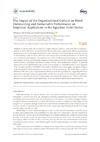Identificador persistente para citar o vincular este elemento:
https://accedacris.ulpgc.es/jspui/handle/10553/76457
| Campo DC | Valor | idioma |
|---|---|---|
| dc.contributor.author | Gebril Taha Ahmed, Mahmoud | en_US |
| dc.contributor.author | Espino Rodríguez, Tomás Francisco | en_US |
| dc.date.accessioned | 2020-12-09T12:58:59Z | - |
| dc.date.available | 2020-12-09T12:58:59Z | - |
| dc.date.issued | 2020 | en_US |
| dc.identifier.other | Scopus | - |
| dc.identifier.uri | https://accedacris.ulpgc.es/handle/10553/76457 | - |
| dc.description.abstract | In recent years, the concept of an organizational culture in hotels has held an important position on both a theoretical and practical level because this culture significantly affects organizational performance and the strategies adopted by hotels. Therefore, it is considered one of the key factors in determining hotels’ tendency towards outsourcing and sustainable performance. In this study, we aim to analyze the impact of the organizational culture on the level of outsourcing and sustainable performance. To do so, we will use the Competing Values Framework (CVF), which divides organizational culture into four typologies: hierarchical, group, rational, and development cultures. A personal questionnaire was administered to the directors or managers of 114 hotels located in two Egyptian cities: Hurgada and Sharm El Sheikh. The results of the structural model suggest the negative impact of the hierarchical and development cultures on the level of outsourcing. The results show a positive influence of the four types of organizational culture on sustainable performance, suggesting that these hotels have a strong interest in sustainability and the environment. The findings reveal a negative relationship between the level of outsourcing and sustainable performance. Finally, this study presents academic and practical implications, as well as recommendations for future research. | en_US |
| dc.language | eng | en_US |
| dc.relation.ispartof | Sustainability (Switzerland) | en_US |
| dc.source | Sustainability (Switzerland)[EISSN 2071-1050],v. 12 (22), 9687, p. 1-25, (Noviembre 2020) | en_US |
| dc.subject | 531290 Economía sectorial: turismo | en_US |
| dc.subject.other | Competing Values Model | en_US |
| dc.subject.other | Organizational Culture | en_US |
| dc.subject.other | Outsourcing | en_US |
| dc.subject.other | Sustainable Performance | en_US |
| dc.title | The impact of the organizational culture on hotel outsourcing and sustainable performance an empirical application in the egyptian hotel sector | en_US |
| dc.type | info:eu-repo/semantics/Article | en_US |
| dc.type | Article | en_US |
| dc.identifier.doi | 10.3390/su12229687 | en_US |
| dc.identifier.scopus | 85096326334 | - |
| dc.contributor.authorscopusid | 57219968326 | - |
| dc.contributor.authorscopusid | 8582478200 | - |
| dc.identifier.eissn | 2071-1050 | - |
| dc.description.lastpage | 25 | en_US |
| dc.identifier.issue | 22 | - |
| dc.description.firstpage | 1 | en_US |
| dc.relation.volume | 12 | en_US |
| dc.investigacion | Ciencias Sociales y Jurídicas | en_US |
| dc.type2 | Artículo | en_US |
| dc.description.notas | This article belongs to the Special Issue Outsourcing Strategy and Sustainability | en_US |
| dc.utils.revision | Sí | en_US |
| dc.date.coverdate | Noviembre 2020 | en_US |
| dc.identifier.ulpgc | Sí | en_US |
| dc.contributor.buulpgc | BU-ECO | en_US |
| dc.description.sjr | 0,612 | |
| dc.description.jcr | 3,251 | |
| dc.description.sjrq | Q1 | |
| dc.description.jcrq | Q2 | |
| dc.description.scie | SCIE | |
| dc.description.ssci | SSCI | |
| dc.description.erihplus | ERIH PLUS | |
| item.fulltext | Con texto completo | - |
| item.grantfulltext | open | - |
| crisitem.author.dept | GIR IUCES: Estrategia y Negocios Internacionales | - |
| crisitem.author.dept | IU de Cibernética, Empresa y Sociedad | - |
| crisitem.author.dept | Departamento de Economía y Dirección de Empresas | - |
| crisitem.author.orcid | 0000-0002-4292-504X | - |
| crisitem.author.parentorg | IU de Cibernética, Empresa y Sociedad | - |
| crisitem.author.fullName | Ahmed, Mahmoud Gebril Taha | - |
| crisitem.author.fullName | Espino Rodríguez, Tomás Francisco | - |
| Colección: | Artículos | |
Citas SCOPUSTM
12
actualizado el 08-jun-2025
Citas de WEB OF SCIENCETM
Citations
12
actualizado el 01-feb-2026
Visitas
75
actualizado el 10-ene-2026
Descargas
65
actualizado el 10-ene-2026
Google ScholarTM
Verifica
Altmetric
Comparte
Exporta metadatos
Los elementos en ULPGC accedaCRIS están protegidos por derechos de autor con todos los derechos reservados, a menos que se indique lo contrario.
